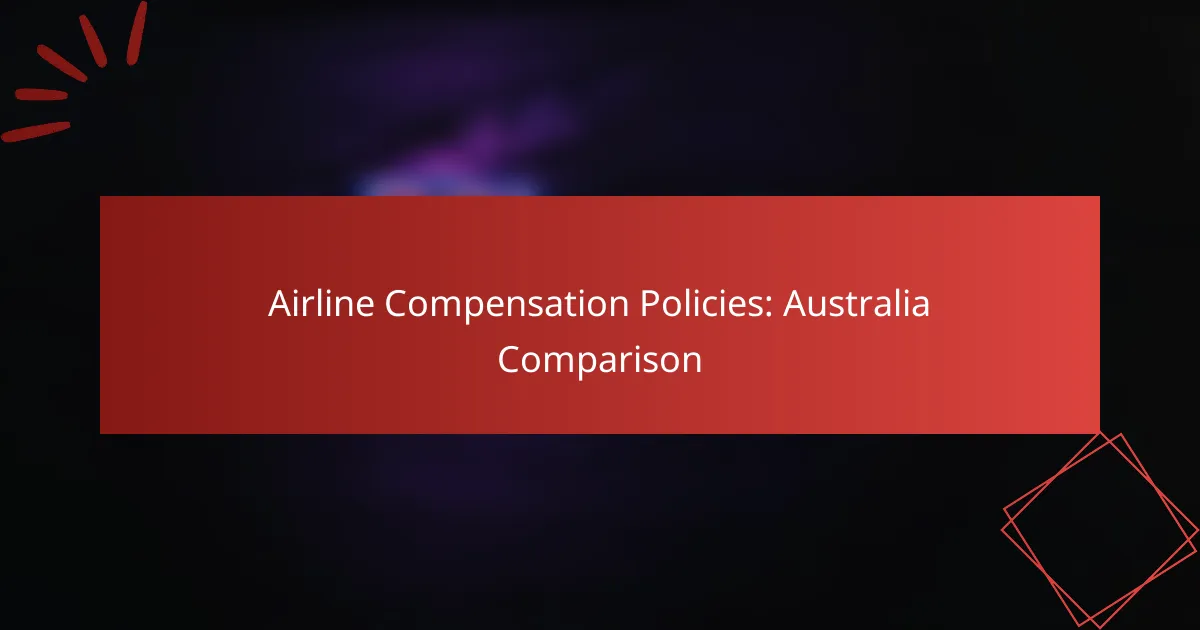In Australia, airline compensation policies differ among carriers and are shaped by regulations concerning flight disruptions like delays, cancellations, and denied boarding. Passengers may be eligible for compensation, which can take the form of monetary reimbursement, travel vouchers, or alternative travel arrangements, depending on the circumstances of the disruption.
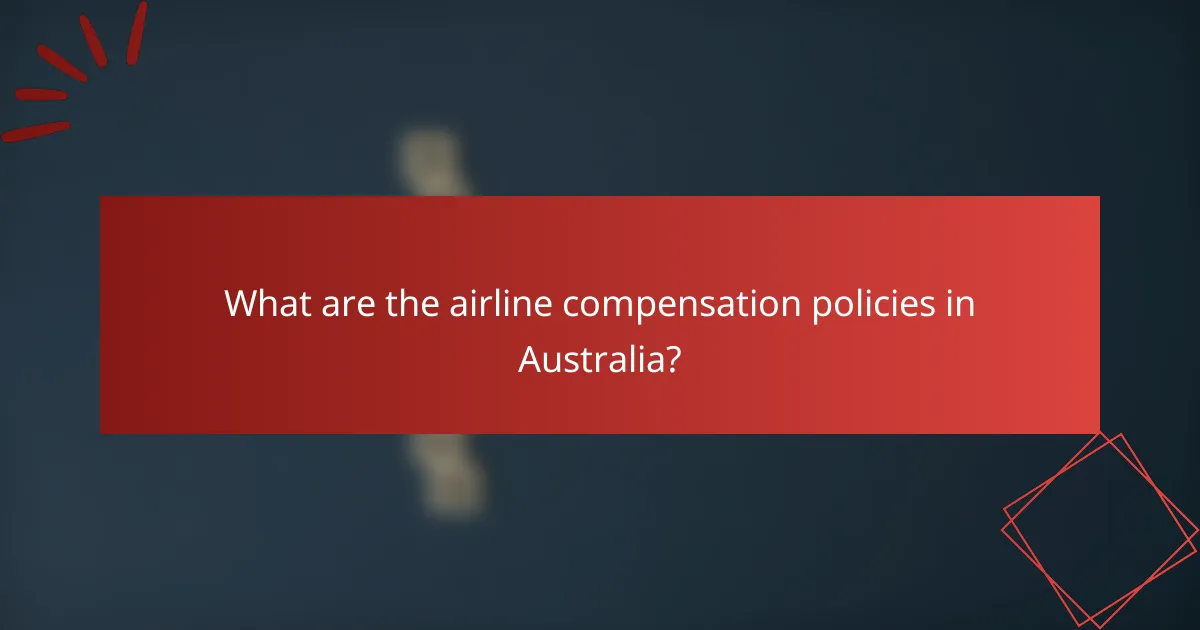
What are the airline compensation policies in Australia?
In Australia, airline compensation policies vary by carrier and are influenced by regulations regarding flight delays, cancellations, and denied boarding. Passengers are generally entitled to compensation under certain circumstances, which can include monetary reimbursement, travel vouchers, or alternative travel arrangements.
Qantas compensation policy
Qantas offers compensation for flight delays and cancellations based on the length of the delay and the reason for the disruption. If a flight is delayed by more than two hours, passengers may receive meals, refreshments, and accommodation if necessary. For cancellations, Qantas typically provides options for rebooking or refunds.
Passengers can claim compensation for significant delays or cancellations due to Qantas’ operational issues, but not for disruptions caused by weather or other extraordinary circumstances. It’s advisable to keep all travel documents and receipts to support any claims.
Virgin Australia compensation policy
Virgin Australia’s compensation policy is similar to that of Qantas, providing assistance for delays and cancellations. If a flight is delayed by more than two hours, passengers may receive meal vouchers or accommodation if the delay extends overnight. In cases of cancellations, Virgin Australia offers rebooking options or full refunds.
Compensation claims are generally accepted for delays caused by the airline’s operational issues, while extraordinary circumstances like severe weather may not qualify. Passengers should document their experiences and retain receipts for any expenses incurred due to the disruption.
Jetstar compensation policy
Jetstar’s compensation policy is more limited compared to its full-service counterparts. For delays over two hours, Jetstar may provide meal vouchers, but accommodation is not guaranteed. In the event of cancellations, passengers can choose to rebook or receive a refund.
Jetstar typically does not offer compensation for delays caused by factors outside its control, such as weather. Passengers are encouraged to review the airline’s terms and conditions and keep records of any additional expenses related to travel disruptions.
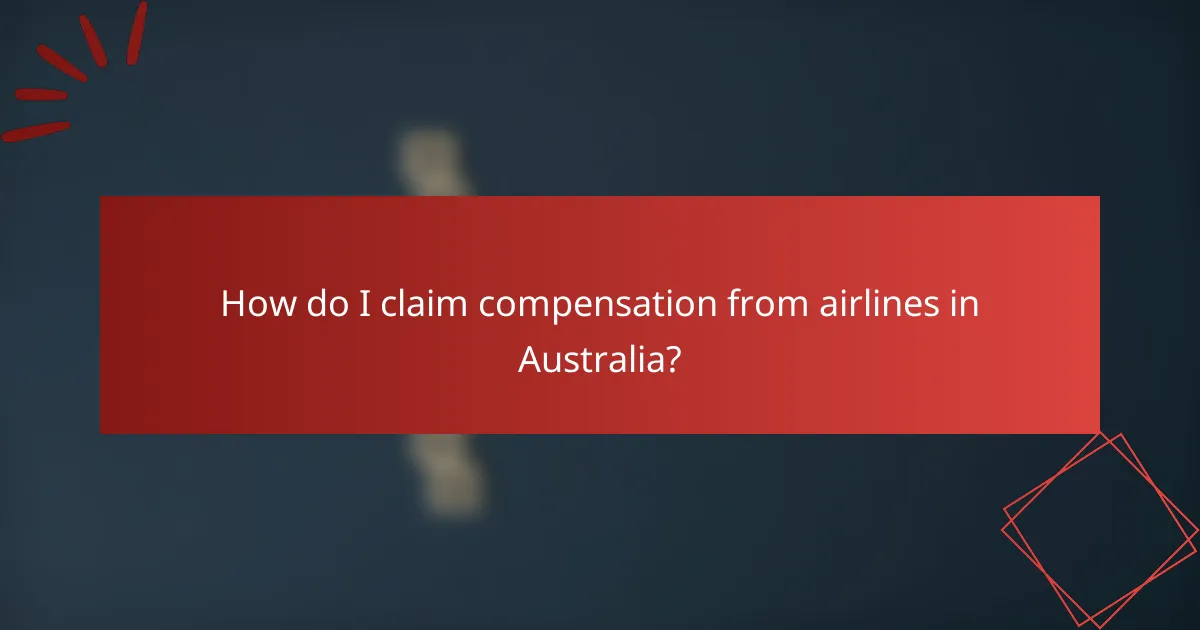
How do I claim compensation from airlines in Australia?
To claim compensation from airlines in Australia, you typically need to submit a formal request to the airline, detailing your flight issues such as cancellations or significant delays. Each airline has its own process, which may involve filling out online forms or contacting customer service directly.
Claim process for Qantas
To initiate a compensation claim with Qantas, visit their official website and navigate to the ‘Customer Service’ section. Here, you can find the ‘Flight Disruption’ page, which outlines the necessary steps and provides an online claim form.
Ensure you have your flight details, including booking reference and travel dates, readily available. Qantas typically processes claims within a few weeks, and compensation may vary based on the circumstances of the disruption.
Claim process for Virgin Australia
For Virgin Australia, claims can be made through their website under the ‘Help’ section. Look for the ‘Flight Disruptions’ link, which will guide you to the claim submission form. You will need to provide relevant flight information and details of the disruption.
Virgin Australia aims to respond to claims within a reasonable timeframe, often within 30 days. Compensation eligibility may depend on factors such as the reason for the delay or cancellation.
Claim process for Jetstar
Jetstar’s compensation claims can be submitted via their ‘Help’ page online. You will find a dedicated section for flight disruptions where you can fill out a claim form. Make sure to include all pertinent details, such as your booking reference and the nature of the issue.
Jetstar generally processes claims quickly, but response times can vary. Compensation amounts are influenced by the specific circumstances surrounding your flight, so be prepared for varying outcomes.
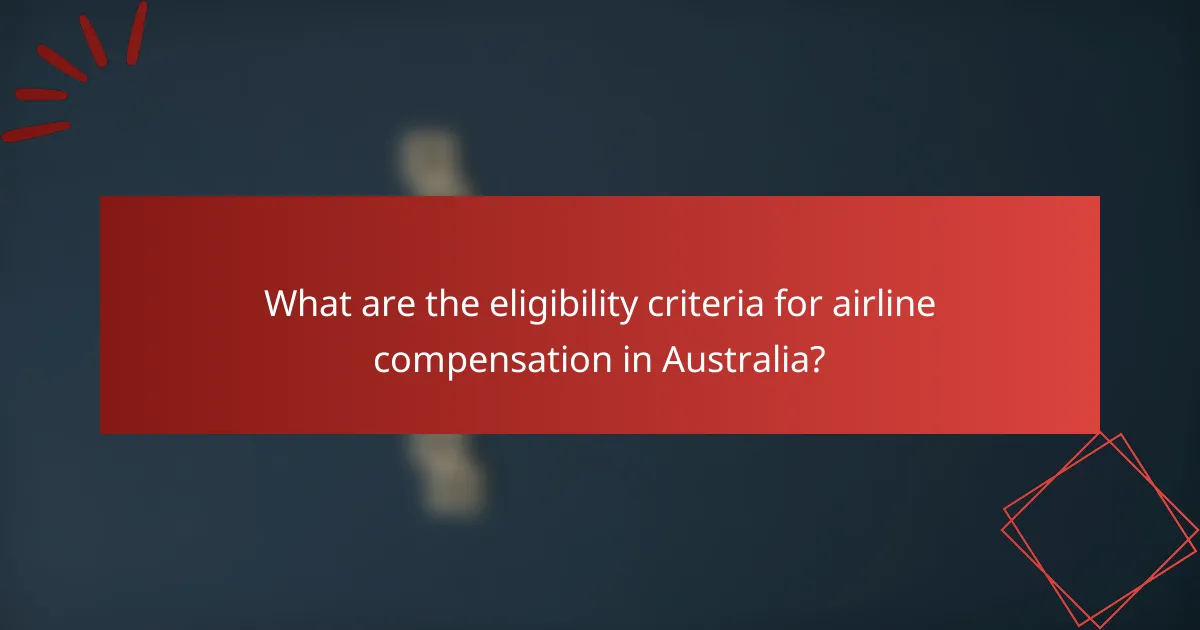
What are the eligibility criteria for airline compensation in Australia?
In Australia, eligibility for airline compensation typically depends on factors such as flight delays, cancellations, and denied boarding. Passengers may be entitled to compensation if the airline is responsible for these disruptions and certain conditions are met.
Eligibility for Qantas compensation
Qantas passengers may qualify for compensation if their flight is delayed by more than three hours, canceled, or if they are denied boarding due to overbooking. The airline generally offers compensation in the form of travel vouchers or refunds, depending on the situation.
To claim compensation, passengers should retain their boarding passes and any communication from Qantas regarding the disruption. Submitting a claim through the airline’s website or customer service is essential for processing.
Eligibility for Virgin Australia compensation
Virgin Australia provides compensation for passengers affected by significant delays, cancellations, or denied boarding. Compensation eligibility typically starts at delays of three hours or more, with options for refunds or travel credits available.
Passengers should document their travel experience and contact Virgin Australia’s customer service to initiate a compensation claim. Keeping records of expenses incurred due to the disruption can also support the claim process.
Eligibility for Jetstar compensation
Jetstar passengers can seek compensation for flight cancellations or delays exceeding three hours, as well as for denied boarding situations. The airline may offer compensation in the form of refunds or travel vouchers based on the circumstances of the disruption.
To ensure a successful claim, passengers should keep all relevant documentation, including booking confirmations and receipts for additional expenses. Claims can be submitted through Jetstar’s online platform or customer service channels.
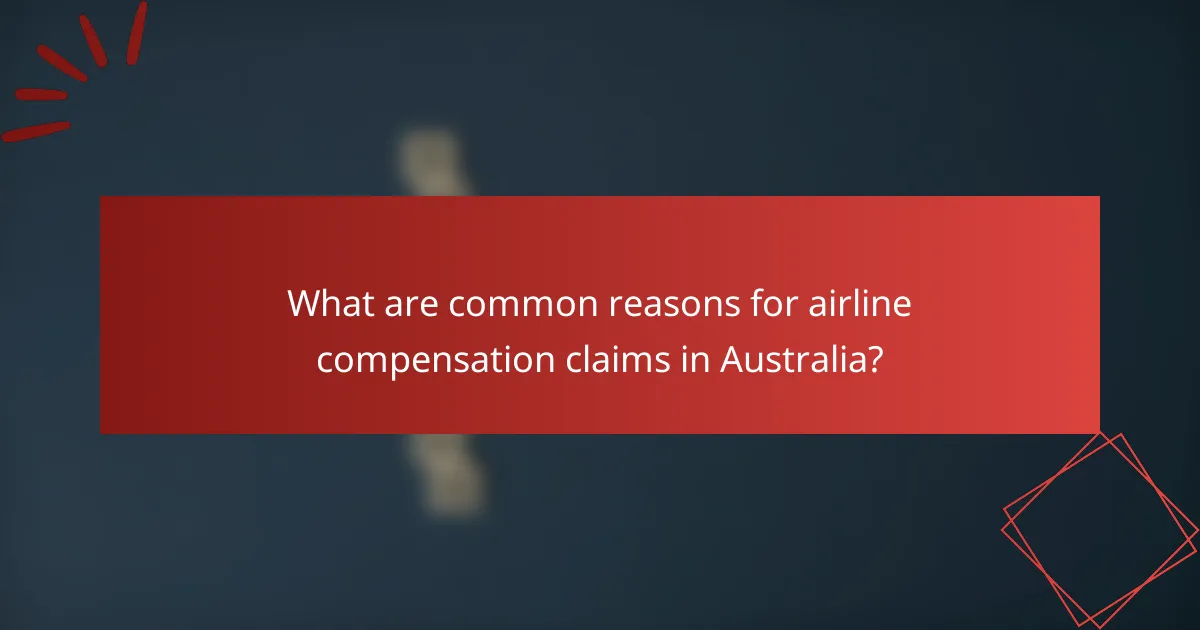
What are common reasons for airline compensation claims in Australia?
Common reasons for airline compensation claims in Australia include flight delays, cancellations, and denied boarding. Passengers may seek compensation when these issues disrupt their travel plans, particularly if the airline is at fault or does not provide adequate notice.
Flight delays
Flight delays occur when an aircraft does not depart or arrive on time, often due to operational issues, weather conditions, or technical problems. In Australia, if a flight is delayed for more than a few hours, passengers may be entitled to compensation, especially if the delay is within the airline’s control.
To claim compensation for delays, passengers should keep records of the delay duration and any communication from the airline. Compensation may vary but can range from a few hundred to over a thousand Australian dollars, depending on the length of the delay and the airline’s policies.
Flight cancellations
Flight cancellations happen when an airline decides to not operate a scheduled flight, which can be due to various reasons such as low demand or operational issues. In Australia, if a flight is canceled, airlines are generally required to provide compensation or alternative travel arrangements.
Passengers should be proactive in seeking compensation for canceled flights. They should document the cancellation notice and any related expenses incurred, such as accommodation or meals. Compensation amounts can vary significantly, often reflecting the distance of the flight and the notice given by the airline.
Denied boarding
Denied boarding occurs when passengers are not allowed to board a flight, typically due to overbooking. In Australia, airlines must compensate passengers who are involuntarily denied boarding, which often includes financial compensation and rebooking on the next available flight.
To navigate denied boarding situations, passengers should be aware of their rights. Compensation may include a cash payment or travel vouchers, and airlines are obligated to provide assistance, such as meals or accommodation, depending on the waiting time for the next flight. Keeping all documentation related to the incident is crucial for a successful claim.
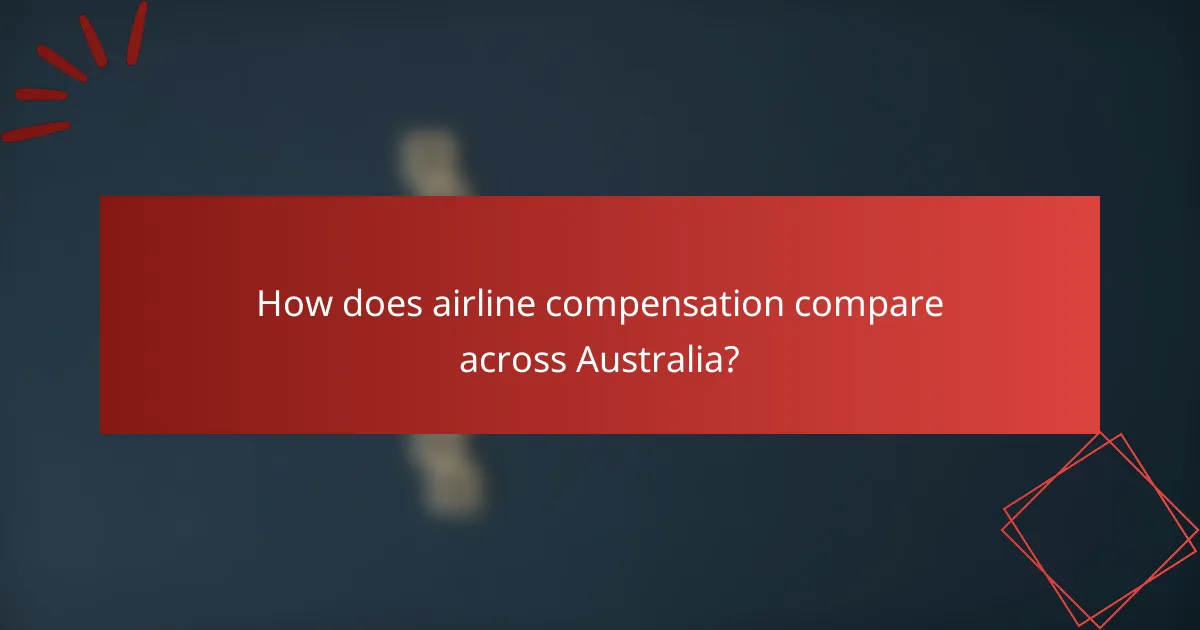
How does airline compensation compare across Australia?
Airline compensation policies in Australia vary significantly among carriers, impacting passengers’ rights during delays, cancellations, and other disruptions. Understanding these differences can help travelers navigate their options for compensation effectively.
Comparison of Qantas and Virgin Australia
Qantas and Virgin Australia both offer compensation for flight delays and cancellations, but their policies differ in specifics. Qantas typically provides compensation in the form of travel vouchers or refunds, depending on the situation, while Virgin Australia may offer similar options but with varying eligibility criteria.
For example, Qantas might compensate passengers for delays exceeding three hours, while Virgin Australia may have a threshold of two hours. It’s essential for travelers to check the terms and conditions of each airline before booking.
Comparison of Jetstar and Qantas
Jetstar, as a low-cost carrier, has different compensation standards compared to Qantas. While Qantas offers more comprehensive support for delays and cancellations, Jetstar’s compensation is often limited, focusing primarily on refunds for canceled flights.
Travelers should note that Jetstar may not provide compensation for delays unless they are significant, typically exceeding three hours. This contrasts with Qantas, which has a more robust compensation framework for affected passengers.
Comparison of Virgin Australia and Jetstar
Virgin Australia generally provides more extensive compensation options than Jetstar, reflecting its position as a full-service airline. Virgin Australia may offer meal vouchers, accommodation, and rebooking options for significant delays, while Jetstar’s compensation is usually confined to refunds or minimal assistance.
Passengers should be aware that Jetstar’s low-cost model means fewer amenities and support during disruptions. Therefore, travelers who prioritize compensation and support may prefer Virgin Australia over Jetstar.
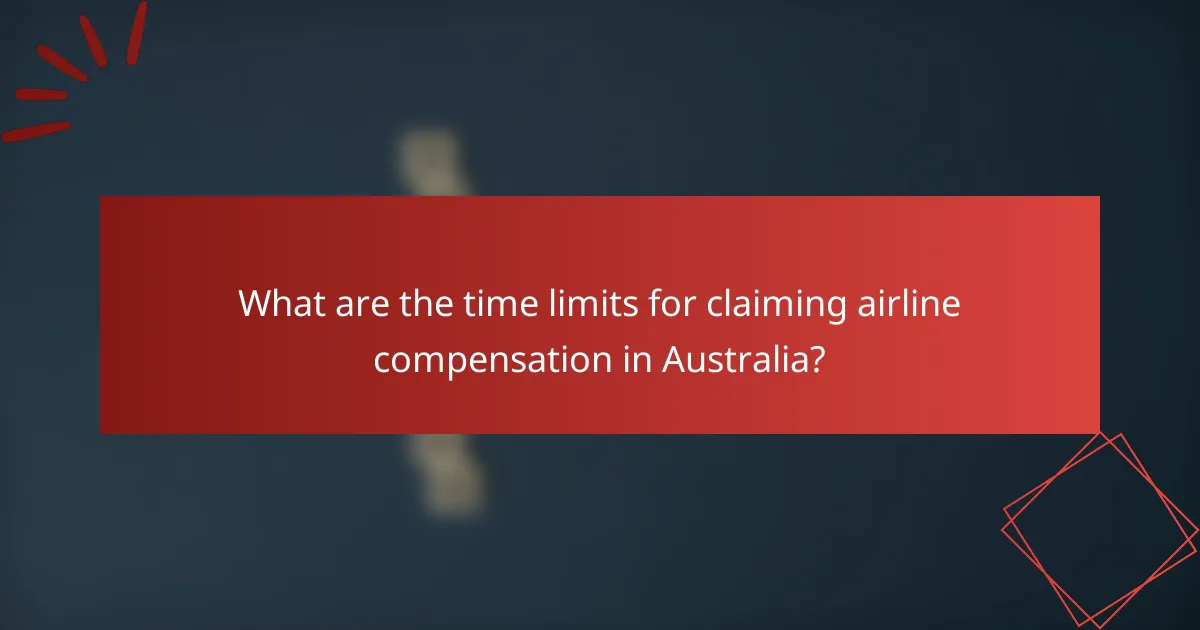
What are the time limits for claiming airline compensation in Australia?
In Australia, the time limits for claiming airline compensation vary by airline and the nature of the claim. Generally, passengers should act quickly, as claims may need to be submitted within a few months to a couple of years, depending on the airline’s specific policies.
Time limits for Qantas claims
Qantas typically requires passengers to submit compensation claims within 30 days for flight delays or cancellations. For lost or damaged baggage, the claim must be made within 21 days of receiving the baggage. It’s advisable to keep all relevant documentation, such as boarding passes and receipts, to support your claim.
Time limits for Virgin Australia claims
Virgin Australia allows passengers to file claims for flight disruptions within 30 days of the incident. For baggage-related issues, claims should be submitted within 21 days. Passengers should ensure they have all necessary evidence, including flight details and any communication with the airline.
Time limits for Jetstar claims
Jetstar requires claims for flight delays or cancellations to be made within 30 days. For issues related to baggage, the time limit is also 30 days from the date of the incident. Keeping a detailed record of your travel experience can facilitate the claims process and improve your chances of a successful resolution.
